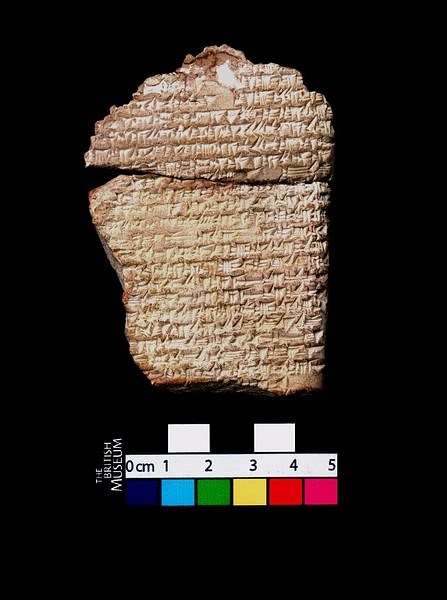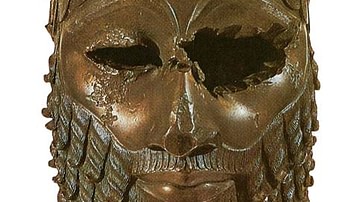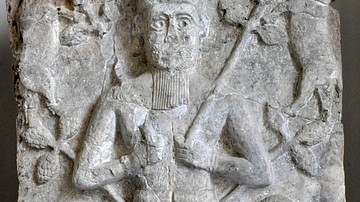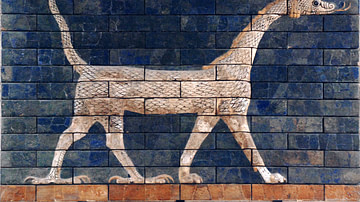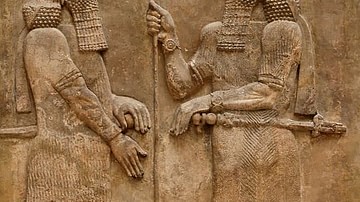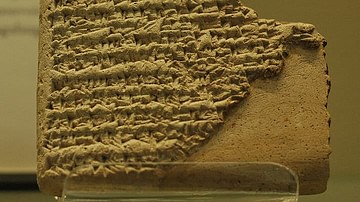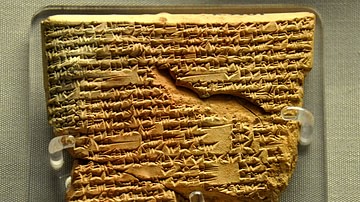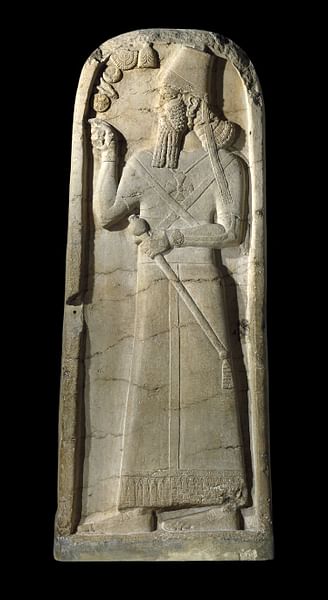
Anu (also known as An) is an early Mesopotamian sky god who was later viewed as the Father of the Gods and ruler of the heavens, a position which then passed to his son Enlil. He is the son of the couple Anshar and Kishar (heaven and earth, respectively), the second-born of the primordial couple Apsu and Tiamat.
He was originally a Sumerian sky deity known as An (meaning 'sky') first referenced in writing during the Early Dynastic Period (2900-2334 BCE) who was adopted by the Akkadians c. 2375 BCE as Anu ('heaven') the all-powerful. Sargon the Great of Akkad (r. 2334-2279 BCE) mentions Anu and Inanna in his inscriptions as legitimizing his rule or helping him in his conquests as he established the Akkadian Empire and maintained order.
Anu is most often represented in iconography simply by a crown or crown on a throne symbolizing his status as King of the Gods, an honor and responsibility later conferred upon Enlil, Marduk (son of Enki/Ea, the god of wisdom), and Assur of the Assyrians, all of whom were believed to have been elevated by Anu and blessed by him. His consort is Antu (also known as Uras, goddess of the earth), and among their many children are the Annunaki, the gods of the earth and judges of the dead, and Nisaba, the Sumerian goddess of writing and accounts. He is also given as the husband of his sister Ki (earth) by whom his son Enlil is born.
Although Anu is not featured prominently in many myths, he is often mentioned as a background figure. This is because, as veneration of the god progressed, he became more and more remote. Initially a sky god and one of the many younger gods born of Apsu and Tiamat, Anu gradually became the lord of the heavens above the sky and the god who ordered and maintained all aspects of existence.
Along with Enlil and Enki, Anu formed a triad which governed the heavens, earth, and underworld (in one version) or, in another, heaven, the sky, and the earth. He was also listed among the oldest gods of the Seven Divine Powers: Anu, Enki, Enlil, Inanna, Nanna, Ninhursag, and Utu-Shamash.
Even though he is rarely a main character in a myth, when he does appear, he plays an important role, even when that role might seem minor. He is referenced in some of the best-known myths from Mesopotamia including Gilgamesh, Enkidu, and the Netherworld, The Epic of Gilgamesh, the Myth of Adapa, and the Enuma Elish.
Anu in the Enuma Elish
The Babylonian epic of creation Enuma Elish (c. 1100 BCE) is the story of the birth of the gods and the formation of the world and human beings. At first, there was only the swirling waters of chaos which divided into a male principle (Apsu, symbolized by fresh water) and a female principle (Tiamat, salt water). These two gave birth to Lahmu and Lahamu, protective deities, and Anshar and Kishar who sire the younger gods. This younger group has little to do and so amuse themselves in various ways which come to anger Apsu; he cannot sleep at night for the noise and they distract him during the day. He eventually decides, after conferring with his vizier, that he must kill them.
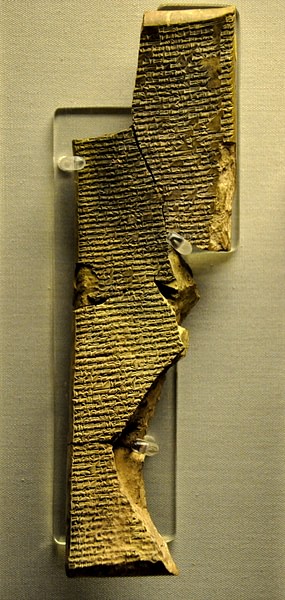
Tiamat overhears her husband's conversation and warns her son (or grandson) Enki of the danger. After considering his options carefully, Enki puts Apsu into a deep sleep and kills him. Tiamat is horrified and disowns the younger gods, quickly assembling an army of demons and monsters to destroy them. The two armies clash and the younger gods are defeated and driven back again and again. At this point, Anu volunteers to go speak with Tiamat and try to resolve the problem diplomatically.
The gods seem to have every confidence in Anu's ability, but when he faces Tiamat, he is cowed and returns to the others to report his failed mission. Anu's failure, however, contributes to the younger gods' ultimate victory. The gods were confident of Anu's success, and when their hope is disappointed, they realize they have to change their ways; they can no longer maintain the old paradigm of how they believe the world should work and must accept change and find a new way of attaining their goal.
It is at this point that Marduk, son of Enki, steps forward to offer himself as their champion if they will elect him their king. Marduk defeats Quingu, the champion of Tiamat, and kills her, but he would not have been chosen if Anu had not failed in diplomacy. Anu, then, ushers in the change in perception which allows for the ultimate victory of the gods. Once peace has been established, Marduk and his father set about the business of creation and the world and human beings are established. Among these humans are those especially skilled in wisdom and the first among the wise is the sage Adapa.
Anu in the Myth of Adapa
The Myth of Adapa (14th century BCE), tells the story of the first man created by Enki and endowed with the god's wisdom. Although Enki loves his son, he recognizes that he cannot give him everything or else he would be like a god and so he holds back the gift of immortality. Adapa has wisdom but this wisdom informs him that he will one day die and he can do nothing about that. He contents himself in service as the king of the holy city of Eridu and high priest in Enki's temple there. To serve his city, he goes out hunting for food and fishing in his boat on the sea.
One day when Adapa is out in his boat the South Wind rushes down and blows him toward shore, breaking his boat into pieces and throwing him into the sea. Enraged, Adapa lashes out and breaks the wings of the South Wind and then goes home. News of this soon reaches Anu, who summons Adapa to him to explain. There is no indication that Anu wishes to punish Adapa, but Enki, seeming to fear Anu's wrath, gives his son explicit instructions on how to behave when he reaches the heavens.
Enki tells him how to greet the gatekeepers, Tammuz and Gishida, what to say to them, and then goes on to warn Adapa against eating or drinking anything offered. Anu is angry, he says, and will offer the food of death and the water of death along with oil for anointing and a fresh robe; the oil and the robe should be accepted, but not the food and drink.
When Adapa appears at the gates, he greets Tammuz and Gishida as instructed, and they are impressed by him and recommend him highly to Anu. Since the first advice Enki gave has obviously proven useful, Adapa follows the rest. Anu listens to Adapa's explanation of the altercation with the South Wind and orders the Food of Life and the Water of Life be brought so that Adapa may become immortal.
He does this because he is impressed by Adapa's wisdom and honesty and cannot understand why Enki would create such a being and not allow it to live forever. When Adapa refuses the food and drink, Anu is confused and asks why he is behaving so. The second tablet of the story is damaged toward the end and the third tablet is broken, but it seems as though Adapa tells Anu of the advice Enki gave him and that Anu becomes angry and punishes Enki.
It seems clear that Enki knew that Anu was going to offer Adapa eternal life and purposefully deceives him to prevent it. Although the text is damaged in the second tablet, there is evidence that this offer can only be made once, and when Adapa refuses the gift, he is given no second chance. The story is similar to the biblical tale of the Fall of Man in Genesis 3:22-23. Though it is not expressed directly in the myth, Enki's reasoning seems similar to Yahweh's in the Genesis story where, after Adam and Eve are cursed for eating of the Tree of the Knowledge of Good and Evil, Yahweh casts them out before they can also eat of the Tree of Life:
Behold, the man is become as one of us, to know good and evil; and now, lest he put forth his hand and take also of the tree of life, and eat, and live forever; Therefore the Lord God sent him forth from the garden of Eden. (Genesis 3:22-23)
Enki understands that human beings cannot be like the gods because that would upset the natural order. Adapa must remain mortal, must keep in his place, for creation to function as it should. In another story, The Atrahasis, it is established that humans are created with limited life spans by the will of the gods. In offering immortality to Adapa, Anu is upsetting the natural order, but he makes the offer because of his compassion; he feels it is a disservice to Adapa to have made him wise enough to recognize his mortality but unable to do anything to escape death. This compassion and understanding are characteristic of Anu as is seen in Enuma Elish when he tries to bring peace through diplomatic negotiation instead of continued war.
The Most High God
Anu's benevolence infused the other gods as he himself withdrew higher and higher into the heavens. He was finally seen as the master creator behind all the workings of the universe but distanced from both humanity and the other gods. The only deity who had access to Anu was his son Enlil who gradually took on his father's characteristics and power.
Even after Enlil became more popular, however, Anu continued to be venerated throughout Mesopotamia. In the city of Uruk, where Inanna was the patron deity, Anu was honored by a large temple-ziggurat which continued in operation from c. 2000 BCE to c. 150 BCE and served as an astronomical observatory and library. A hymn to Anu from early in this period illustrates the high regard he was accorded. The hymn reads, in part:
O Prince of the gods, whose utterance ruleth over the obedient company of the gods; Lord of the horned crown, which is marvellously splendid; thou travellest hither and thither on the raging storm; thou standest in the royal chamber to be admired as a king.
At thy word the gods cast themselves on the ground in a body like a reed on the stream; they command blows like the wind and causes food and drink to thrive; at the word the angry gods turn bck to their habitations
May all the gods of heaven and earth appear before thee with gifts and offerings; may the kings of the countries bring to thee heavy tribute; may men stand before thee daily with sacrifices, prayers, and adorations.
To Uruk, thy city, do thou show abundant favor; O great god Anu, avenge thy city in hostile lands. (Wallis Budge, 106-107)
Even though he was eventually prayed to less and less directly, he was still considered the power behind the power of the gods. Offerings continued to be brought to his temple complex at Uruk long after he was no longer associated closely with the daily lives of the people. Scholar Stephen Bertman writes:
Anu was the august and revered "chairman of the board" of the Mesopotamian pantheon. His name literally meant "heaven". He was the supreme source of authority among the gods, and among men, upon whom he conferred kingship. As heaven's grand patriarch, he dispensed justice and controlled the laws known as the meh that governed the universe. (116)
When the Assyrian Empire fell in 612 BCE, many of the Mesopotamian gods associated with their rule were abandoned. The Assyrians had taken characteristics of many different gods for their own (the best example of this is their great god Assur/Ashur), and those people who felt they had suffered under Assyrian rule vent their frustration and vengeance on Assyrian cities, temples, and the statues of the gods.
Some gods continued to be acknowledged, however, and Anu was among these. Worship of Anu continued into the Hellenistic period of Mesopotamian history and, through his association with Marduk, on up to c. 141 BCE when the Parthians took control the region and the religion of Zoroastrianism became more widespread.
